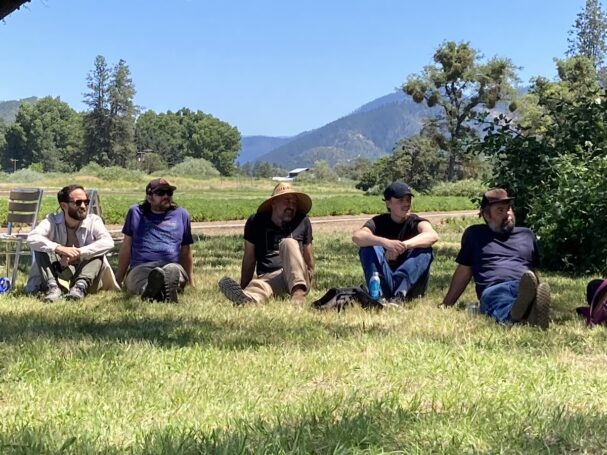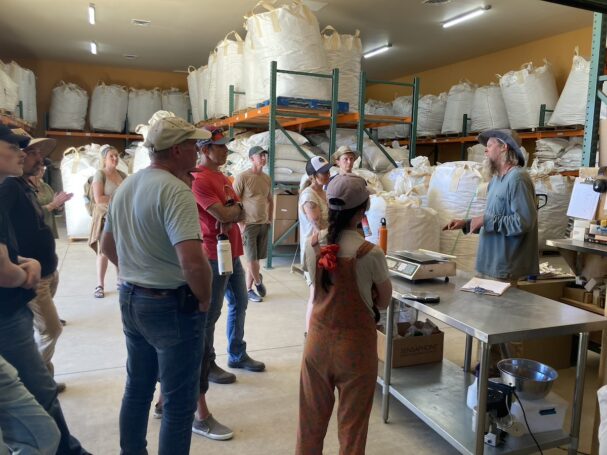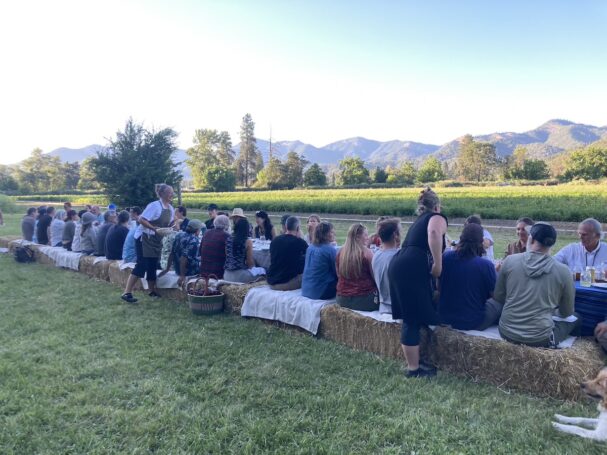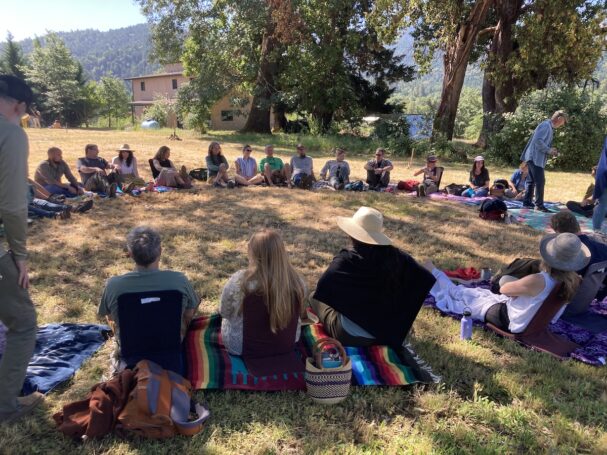Second Learning Journey Goes to Oregon, part 1
From June 10-14, 2024, we held the second Learning Journey to southwest Oregon (read about the first Learning Journey here). Forty people joined for four days to listen to the stories of those working to grow, harvest, and manufacture herbal products in this region. We picked Oregon for the second Learning Journey because a core group of SHI member companies are based here. We also picked it because the roots of organic herb farming in the United States are here and companies in this region first brought attention to the relationship between how herbs are grown and handled and the quality of the finished product.
The first evening, we gathered in a circle in the small yard by the somewhat run down retreat center where we were staying. I began by saying that this wasn’t a typical supplier visit. We were there to listen and to learn, not instruct or correct. I read a passage from my book, Following the Herbal Harvest, that ended with the question: “What does light look like in global supply chains?”
The invitation this week, I said, was to see where and whether that light does flow and to ask how can we as a community nurture it?

What we experienced
During the week together, we toured Pacific Botanicals, Herb Pharm, Oshala Farm, and the Banyan Botanicals Farm. We heard the stories of the Mexican farmworkers at Oshala Farm and heard from Brook Colley, Associate Professor of Native American Studies, Southern Oregon University, about working with indigenous communities around the world. We tried harvesting chamomile with a hand rake, most of us hardly lasted ½ an hour in the hot sun.
That evening we sat on hay bales after dinner for a conversation about the future of the industry with Ed Smith, co-founder of Herb Pharm; Mark Wheeler, founder of Pacifica Botanicals; Marc Allen, previous CEO of Herb Pharm; Daniel Marple, current CEO of Herb Pharm; Cameron Stearns, CEO of Mountain Rose; and Kevin Casey, CEO of Banyan Botanicals.
The final morning, we hiked to Bigelow Lake, we listened to the stories of wild harvesters and the challenges they face, and we reflected on what we would each do if we had 20% more courage.
Listening
We also listened to ourselves, through solo walks and journaling. We listened to each other. The first evening we went on a dialogue walk with someone we didn’t know or didn’t know well to share three events in our lives that defined who we are. We reflected in small groups. On the last afternoon, we hiked down from Bigelow Lake in pairs, reflecting on what action we wanted to bring into our work and lives based on our experience during the week.
And we listened to the plants. One afternoon at Herb Pharm, we each took a dropper from a tincture that had the label covered. We then went out on the land to notice what we observed, how we experienced the plant. We came back to the circle and shared our experience.
Intention in Global Supply Networks
We then shared reflections on how the day itself had been. A day which began with my reading a story by Robin Wall Kimmerer about how kinship is a verb and not a noun. And that continued with the conversation with Brook about how colonialism is a series of takings: land, resources, sovereignty, legitimacy of thought, and children. One that ended with taking a dropper of what we found out was wood betony and being vulnerable enough to talk about that experience with colleagues from work.
As we sat in that circle, I was struck by the original question that set me on this journey years ago: Can intention, another word for light, be found in global supply chains? If so, how would I recognize it?
I realized that my listening for and following the answers to that question had led to this circle, where I sat with people responsible for sourcing and operations, sustainability and quality control who were willing to share how the experience of the aliveness of a plant moving in their body informed their work.
I had longed for these conversations, real conversations about how to do our work in a way that springs from that aliveness, from that sense of respect for the world. From a place of kinship. And here we were, having that conversation.
Circles of Healing
In a recent On Being interview host Krista Tippett spoke with Janine Benyus and Azita Ardakani Walton about what nature has to teach us for navigating the times we are in. They spoke about many things, but what stood out to me was Benyus’s description of how succession works after a landslide or clearcut. “There’s this whole chaperoning and facilitation that happens,” She said. “And then in the shade and the windshields of these trees, of these shrubs, little seedlings start and then those seedlings become the overstory that we know about. So literally it is a progression of making way, making things more and more fertile for the next cohort to come. So there’s this incredible generosity and everybody’s got their place.”
“When people ask me, how are things going?” Benyus continued, extending her comments to what she sees happening in human communities as well. “[I say] I think the circles of healing are starting to grow and they’re starting to grow towards each other. And if we were to reach out our hand in the dark at this point, we might find another hand.”
She then described a process known as nucleating a forest, where you need to regenerate only 16% of a forest or a field to regenerate it. You just need to put in welcoming islands where these circles of healing can take root, she said.
Questions
Here are some of the questions and points that arose during our time together:
- What are the hidden costs of farming? What goes into the health of the farm? The health of the workers?
- How do you calculate the cost of how many times a tractor runs through a field for planting, for weeding, for harvesting?
- Listening helps build the cohesiveness of a company, Mark Wheeler, the founder of Pacifica Botanicals, told us as we toured the farm. “Sometimes people just wanted to be listened to,” he said.
- How can we close the gap between being outside and the work that needs to be done inside? If we spend more time outside maybe we don’t need all these products. “It seems like we’ve kind of gotten off track,” Kevin Casey, CEO of Banyan Botanicals said in a circle after our tour at Pacific Botanicals.
- How can understanding colonial history help us get to underlying issues around equity?
- Mark Wheeler mentioned the for every machine that works, 3 or 4 break. Gero Diekmann, who joined the Learning Journey from Namibia, said that no producer overseas can take that risk.
- Matt Richards from the Organic Herb Trading Company spoke of the difference between going on a supplier visit and focusing on compliance versus this trip where he could focus on connection and listening.
- How to create healthy places for farmworkers so they can afford a home and raise their families?
- What is the moral ecology for this work? As Brook Colley told us, human beings are not the only ones at the center. All living beings have personhood, all living beings have inherent value.
- Cultural competency is a project that will never be complete but we need to do our part to undo the harm that has been done, Brook told us. To ask, what can I do to support your community? When you begin to source from a community, ask: who lived here? What happened? Where are they now? What did they know?
- James Yungwirth, a wildharvester through his company, Naturespirit Herbs, told us that you don’t just walk into someone’s house and take sugar. You arrive with a gift. And so when he enters a place to harvest plants, he likes to introduce himself. He shares how the plants will be used, showing recognition and respect that something is being sacrificed for someone’s health. And Elliot Proffitt led us in a song as we sat in the meadow above the Bigelow Trailhead, sharing how he introduces himself when he goes to wild harvest.
- Alan Odessee said that the paperwork and regulations are way too much. He understand that companies want to know where their herbs are from, but they don’t realize the cost and the impact of providing that information. “They just want cheap herbs.”
- And so much more….
Taking Care
Especially at Oshala Farm but really in all the conversations we had, I was struck by how much work it takes to grow, harvest, and process herbs in a way that cares for the plants, the soil, and the people. And by how the larger system makes taking care even more difficult than it already is.
And so I especially took heart from this idea of creating circles of healing, welcoming islands where we remember that we are here to take care. To take care of each other, ourselves, the plants, and the planet. Business can be a pathway for this but it isn’t inevitable that it is. It takes work and attention and intention to ensure that what is created is a circle of healing and not just another product.
This is what we are trying to do at the Sustainable Herbs Initiative. Find out more about how to become a member here.



